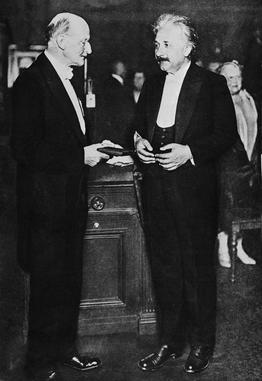Max Planck
Max Planck (April 23, 1858 – October 4, 1947) was a German theoretical physicist whose discovery of energy quanta won him the Nobel Prize in Physics in 1918. Planck is considered the father of the quantum theory, and his work laid the foundation for the development of quantum mechanics, a branch of physics that has had profound implications for our understanding of the physical world.
Early Life and Education[edit | edit source]
Max Karl Ernst Ludwig Planck was born in Kiel, Germany, to Johann Julius Wilhelm Planck and his second wife, Emma Patzig. He was the sixth child in the family, though some of his siblings did not survive into adulthood. Planck showed early aptitude in music and academics, excelling in subjects such as physics and mathematics. He pursued his higher education at the University of Munich and the University of Berlin, where he was influenced by the works of Gustav Kirchhoff and Hermann von Helmholtz, two leading physicists of the time.
Career and Research[edit | edit source]
After completing his doctorate, Planck began his academic career at the University of Kiel in 1885. He later moved to the University of Berlin in 1889, where he spent much of his career. It was here that Planck conducted his groundbreaking research on black-body radiation. In 1900, he presented his quantum hypothesis, which posited that energy is emitted in discrete units called quanta, rather than in a continuous wave. This idea was revolutionary and marked the birth of quantum theory.
Planck's work on quantum theory initially faced skepticism from the scientific community. However, its predictions were confirmed by experiments, such as the photoelectric effect, which was explained by Albert Einstein in 1905. Planck's constant, a fundamental constant denoting the size of these quanta, is a cornerstone of quantum mechanics.
Throughout his career, Planck made significant contributions to the fields of thermodynamics and statistical mechanics. He was also a key figure in the establishment of the Kaiser Wilhelm Society (now the Max Planck Society), a leading German research organization.
Personal Life and Legacy[edit | edit source]
Planck faced personal tragedy during World War I when his son was killed in action. He also suffered during World War II; his home was destroyed in an air raid, and another son was executed for his involvement in a plot to assassinate Hitler.
Despite these hardships, Planck remained dedicated to his research until his death in 1947. His legacy lives on through the Max Planck Society, which continues to be a leading institution for scientific research. Planck's work on quantum theory has also had a lasting impact on physics, influencing the development of technologies such as semiconductors and lasers.
Awards and Honors[edit | edit source]
Planck received numerous awards and honors throughout his life, including the Nobel Prize in Physics in 1918 for his work on quantum theory. He was also a member of various scientific academies around the world.
See Also[edit | edit source]
Search WikiMD
Ad.Tired of being Overweight? Try W8MD's physician weight loss program.
Semaglutide (Ozempic / Wegovy and Tirzepatide (Mounjaro / Zepbound) available.
Advertise on WikiMD
|
WikiMD's Wellness Encyclopedia |
| Let Food Be Thy Medicine Medicine Thy Food - Hippocrates |
Translate this page: - East Asian
中文,
日本,
한국어,
South Asian
हिन्दी,
தமிழ்,
తెలుగు,
Urdu,
ಕನ್ನಡ,
Southeast Asian
Indonesian,
Vietnamese,
Thai,
မြန်မာဘာသာ,
বাংলা
European
español,
Deutsch,
français,
Greek,
português do Brasil,
polski,
română,
русский,
Nederlands,
norsk,
svenska,
suomi,
Italian
Middle Eastern & African
عربى,
Turkish,
Persian,
Hebrew,
Afrikaans,
isiZulu,
Kiswahili,
Other
Bulgarian,
Hungarian,
Czech,
Swedish,
മലയാളം,
मराठी,
ਪੰਜਾਬੀ,
ગુજરાતી,
Portuguese,
Ukrainian
Medical Disclaimer: WikiMD is not a substitute for professional medical advice. The information on WikiMD is provided as an information resource only, may be incorrect, outdated or misleading, and is not to be used or relied on for any diagnostic or treatment purposes. Please consult your health care provider before making any healthcare decisions or for guidance about a specific medical condition. WikiMD expressly disclaims responsibility, and shall have no liability, for any damages, loss, injury, or liability whatsoever suffered as a result of your reliance on the information contained in this site. By visiting this site you agree to the foregoing terms and conditions, which may from time to time be changed or supplemented by WikiMD. If you do not agree to the foregoing terms and conditions, you should not enter or use this site. See full disclaimer.
Credits:Most images are courtesy of Wikimedia commons, and templates, categories Wikipedia, licensed under CC BY SA or similar.
Contributors: Prab R. Tumpati, MD






